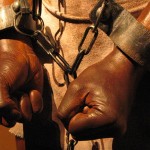
Slavery is twice mentioned in the ten commandments found in the Bible, but not once in the ten commandments of the Qur’an.
First, a knowledgeable Jew or Christian knows fully well that slavery is discussed in the Bible. The Jewish law has much to say about slaves and their treatment. This matter is not open to debate. It is a fact every rabbi and a trained pastor is aware of.
Second, just as the Jews and Christians do not discuss slavery in their teachings and sermons, Muslims do not teach much on the subject. Why? The simple reason is that slavery as it existed in ancient times does not exist anymore. To talk of ‘slavery in Islam’ as if the Muslims practice it today is dishonesty.
Every country has laws against slavery. However, experts say that slavery has taken a new form today that we shall discuss briefly.
UN Definition of Slavery
The slave has three defining characteristics: his/her person is the property of another human being, his/her will is completely subject to his/her owner’s authority, and his/her labor is obtained by coercion.
The international community condemned slavery as one of the worst human-rights violations, and the classic definition of slavery, set out in the Slavery Convention of 1926 is, “The status or condition of a person over whom any or all of the power attached to the right of ownership are exercised.”
In 1956, several additional definitions of slavery were added: debt bondage, serfdom, the practice of forced marriage, transferring of wives, inheritance of wives and transfer of a child for purposes of exploitation.
Roots of Slavery in the Bible
The Bible, in both Old and New Testaments, endorses slavery. The Bible existed before the Qur’an.
The Bible states that once Noah awoke and found out that one of his sons, Ham, had seen him naked. Noah cursed his misbehaving son, Ham, and all the descendants of Canaan, the son of Ham, saying: “a slave of slaves shall you be to your brothers” (Gen 9:25). It must be noted that this story or anything similar to it is not found in the Qur’an or the teachings of Prophet Muhammad (peace be upon him).
There is a long tradition among Christians that Ham is the father of the black races of Africa, Shem is the father of Semites (that includes the Arabs and Jews), and Japheth is the father of the while people. Therefore, this passage of the Bible is considered to have made the white races supreme and the black race their servants.
This “biblical passage became for many centuries a major justification for black slavery”, as David Brion Davis, Inhuman Bondage say in: “The Rise and Fall of Slavery in the New World”. Not too long ago, in South Africa, the Reformed Church referred to this “curse” to support the “right” of whites to rule over blacks.
Slavery is twice mentioned in the ten commandments found in the Bible, but not once in the ten commandments of the Qur’an.
Leviticus 25:44-46, one of the books of present day Torah, the Jewish scripture, is a key text used for the biblical justification of slavery. It says that God told Jews, “you may also buy male and female slaves from among the nations…you may bequeath them to your sons after you, to inherit as a possession for ever.”
Abraham, ”the friend of God,” and “the father of the faithful,” bought slaves from Haran (Gen 12:50), armed 318 slaves born in his own house (Gen 14:14), included them in his property list (Gen 12:16, 24:35-36), and willed them to his son Isaac (Gen 26:13-14).
The Bible says that God blessed Abraham by multiplying his slaves (Gen 24:35). In Abraham’s household, angels tell Hagar, his slave, to return to Sarah. The angel tells her, “return to your mistress and submit to her”. (Gen 16:9)
At God’s command, Joshua took slaves (Josh 9:23), as did David (1 Kings 8:2,6) and Solomon. (1 Kings 9:20-21)
Job whom the Bible calls “blameless and upright”, was “a great slaveholder.” See Job 1:15-17, 3:19, 7:2, 31:13, 42:8 where Job speaks of his slaves.
Jesus accepted slavery. The present day Gospels do not have a single word attributed to Jesus as saying anything about slavery. Jesus met slaves (Luke 7:2-10, 22:50, etc.) and gave parables of slaves (Matthew 13:24-30, 18:23-35, 22:1-14, Luke 12:25-40, 14:15-24, etc.), but he never spoke against slavery. Compare it to what the Arabian Prophet of Islam said about slaves in the next article.
In some seventy passages the disciples spoke directly in support of slavery. They told slaves to accept their fate and instructed their masters to treat them kindly (1 Corinthians 7:20-21, Eph 6:5-9, Col 3:22-25, 1 Tim 6:1-2, Tit 2:9-10, Phlm 10-18, 1 Peter 2:18-19). 1 Tim 6:1-3 instructs slaves to accept their position and obey their masters because it is commanded by “Lord Jesus Christ.”
Most Christian theologians and scholars until late last century believed that the Bible sanctioned slavery. The list includes Augustine, Aquinas, Luther, Calvin, and others.
In 1835, the Presbyterian Synod of West Virginia attacked the movement to set slaves free, calling it a belief that goes against “the clearest authority of the word of God.’
Old School (Presbyterian) General Assembly Report of 1845 concluded that slavery was based on ‘some of the plainest declarations of the Word of God.’
In 1861, a Jewish Rabbi, Dr. M.J. Raphall of New York, wrote a much publicized pamphlet entitled “The Bible View of Slavery” in defense of slavery.
As late as 1957 John Murray of the Westminster Theological Seminary was still arguing that Bible allows for the institution of slavery and the past Christian scholars were correct in their understanding of the Bible.
To be continued…
_________________________
Source: IslamHouse.
 Arabic
Arabic English
English

